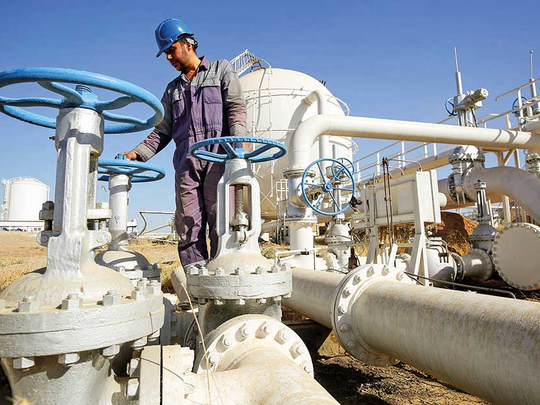
Abu Dhabi: Oil is expected to hover around the high $50s to low $60s per barrel in the coming months if the Organisation of Petroleum Exporting Countries (Opec) decides to extend a production cut agreement until 2018, analysts said.
Brent surged to $60 (Dh220.38) a barrel for the first time in more than two years on optimism that Opec is likely to extend the output curbs deal beyond March 2018.
Saudi Crown Prince Mohammad Bin Salam backed the extension of the agreement struck with non-Opec members, saying it helped in rebalancing of oil markets.
“I see oil sustaining in the high [$]50s range but a lot of it depends on Opec’s decision to extend cuts into 2018. I am 60 per cent certain that they will extend [the] decision until 2018 at their next month’s meeting in Vienna but there is also a possibility they will defer the decision for another two or three months,” Jaafar Al Taie, managing director at Dubai-based Manaar Energy Consulting, told Gulf News over phone.
“If they extend the cuts, the price will hover around high $50s [per barrel] to low 60s. If the Opec does not extend cuts, I am worried about Iraq, US, Libya and Nigeria producing more and adding extra supply to the market. Oil has a potential to plunge below $50 per barrel in that scenario.”
Along with other producers including Russia, Opec agreed to cut output by about 1.8 million barrels per day through March 2018 to balance the market.
Oil-producing countries will meet in Vienna on November 30 to take stock of the oil market situation and to decide whether to extend the deal beyond March.
When asked if there could be any geo-political risk to oil price especially due to on-going conflict between Kurds and Iraqi armed forces, he said it’s a risk but not a major one as both Iraq and Kurdistan are still pumping oil.
Iraqi government troops seized Kirkuk airport and took control of northern Iraq’s oil company from the security forces of the autonomous Kurdish region, known as the Peshmerga, earlier this month, pushing oil prices higher.
Global benchmark Brent was trading at $60.44 per barrel, up by 1.92 per cent and West Texas Intermediate at $53.90 per barrel, up by 2.39 per cent when markets closed on Friday.












